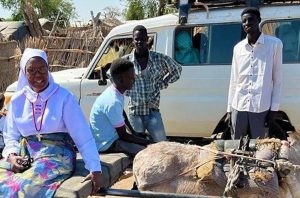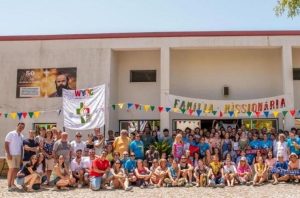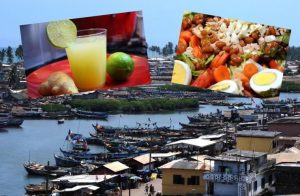The greeting gesture has great importance among the Karimojong of Uganda. It has to be performed with the right hand, which is considered the noble hand, while verbally wishing long life, eternal friendship, and wealth.
Karimojong greetings consist of gestures and words. The most common greeting gesture is the handshake. Everyone shakes hands, even with children. But it is important to know, in order to understand the importance of this gesture among the tribe, the meaning attributed to the hands. The left hand is considered ‘the servant hand’, and it is its task to help the right hand. When a person is offered food, they take it first with their left hand and then bring it to their mouth with the right hand. The left hand is considered ‘weaker’, and so it serves to perform minor tasks such as holding a stick, moving a stool, working the field with a short hoe, driving away flies from the face, scratching the head, or milking a goat.
The noble hand
The right hand is considered the ‘master hand’, and it is used for the toughest works: carrying heavy things, chopping wood with an axe, milking a cow, beating someone with a stick, hurling a stone, washing the face, and brushing the teeth. The Karimojong people always greet with their right hand. Greeting is a meaningful gesture among this tribe: it implies welcoming a person – creating the basis for a long and friendly relationship with a view to a peaceful and harmonious life. When a member of this tribe feels they have been betrayed by someone, they say, “We shook hands, how could you betray me?”.
The forehead is also used in greetings among the Karimojong people. When a family man returns home after a long absence, he puts his hands on his children or relatives’ shoulders and they rub foreheads. This gesture, however, is considered inappropriate between husband and wife. A father, a mother, and a grandmother, when meeting their son or grandchild, who has been away for a long time, may place his head under their armpit, as a gesture of greeting. The brothers, sisters, and other relatives, may shake hands with the loved one who has just returned home after a long time, or also hug him and put their forehead on his shoulders. These intimate greetings express joy and closeness.
Hello my friend
Words also play an important role in greetings among the Karimojong people. Words, in fact, confirm and clarify gestures. The spoken greeting can be short or long. The morning greeting generally consists of a short conversation: “Iperir ya? (Did you sleep?) – “Ee, iperit ba iyong to?” (Yes, I did, and you?). Whereas if they meet during the day, the Karimojong say: “Iyai to?” (Do you exist?) – “Ee, iyai ba iyong to?” (Yes, I do, and you?). When they leave they say: “Ikianyun” (We will meet again); or: “Ilcidari Epei” (The One [God] will protect us). Children’s greetings are less formal: “Ejok to?” (Are you well?), “Ee, ejok” (Yeah, I am). The evening greeting is: “Toper ejok” (Sleep well).
The greetings among this tribe, however, can be much more elaborate, as a matter of fact a real dialogue, through which two friends who meet seem to remind each other that life is a gift that must be preserved as long as possible: “Hello!” – “Hello again”. – “May we live a long life!” – “May we meet again!”. – “May we have the fortune of getting old and seeing each other walking with a stick!” – “May we become rich and famous!”. At other times Karimojong greetings are basically exchanged wishes for a large kinship, in order to perpetuate themselves through their children even after death: “Hello! May we be surrounded by good people, strong men, women, and children, and have numerous offspring!” Karimojong greetings can also consist of wishes for a wealthy life: “Hello, may we have rain!” – “May we have a large number of livestock!” “May we own many cows and dromedaries!” – “May we always have sorghum and beer!” – “May we live in fertile lands and attend beautiful parties!” Nowadays greetings are expressed with just a few words, and gestures are getting more and more rare, especially in the large cities which are home to different ethnic groups. Human situations and the ways of relating to other people have changed, and so have greetings.








